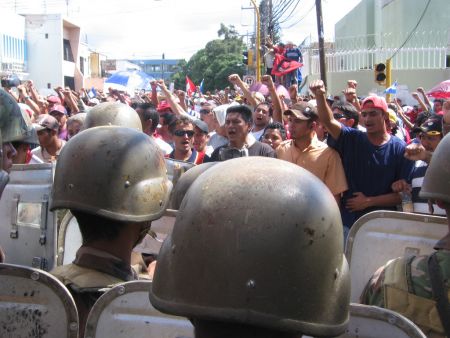STORY about Solidaritypublié le Octobre 12, 2009 by dawn
Coup Resistance Steadfast in Honduras
Vancouverite detained by INTERPOL in Tegucigalpa speaks out
Over one hundred days after the June 28 military coup in Honduras, news about the coup regime, the status of President Zelaya and the continued repression of resistance movements has all but fallen off of the North American media map.
Steve Stewart, a Vancouver based solidarity activist who works with CoDevelopment Canada, a small non governmental organization, traveled to Honduras in early September as part of a human rights delegation.
"I did get to experience first hand the levels of paranoia in the coup leadership," Stewart told the Vancouver Media Co-op by phone from his office in East Vancouver.
"Upon leaving the country, myself and a Colombian delegate were taken for questioning at a police base."
Stewart's briefcase containing documentation of the delegation was stolen and later turned out to be in the possession of INTERPOL, who detained Stewart and Colombian educator Guillermo Baquero. The two men were later turned over to the Honduran Special Intelligence Forces (COBRAS), taken to a military base and interrogated. They were held for more than seven hours.
Stewart wrote his name on a piece of paper, which was smuggled out of the interrogation room by a member of the resistance. Within one hour, lawyers arrived to assist Stewart and Baquero, who were eventually released.
"Through a chance encounter we were able to access a lawyer and leave the country, but there are thousands of Hondurans who have been illegally detained and suffered a worse fate," stated Stewart in a press release after his detention.
As for his visit to Honduras, "we participated in one march that wasn't massive, but it was large, it had about 5,000 people in it," said Stewart. "Then we discovered that they do that every single day, and not just in Tegucigalpa but in a number of the other primary cities around the country."
"The ability for them to sustain this struggle was quite impressive," he said.
Stewart talked about how the demands of the popular movements have changed since the initial days of the coup.
"The primary demand in the streets now is -whether Zelaya comes back or not- to go straight to creating a new constitutional assembly. The coup and it's aftermath have really put into stark contrast the contradictions in the country, and people strongly feel that the whole system needs to be refounded now."
Media coverage of the coup in Canada has been waning, but when there is coverage, Stewart noted there tends to be misinformation about the constitutional reform process Zelaya was proposing when he was removed from the country to Costa Rica.
The media has placed "a real kind of focus on what ousted President Zelaya is doing, what the coup leaders are doing, and much less on the size and scope of the social movements," said Stewart.
Demonstrations in favour of President Zelaya's return, Tegucigalpa, September 23, 2009. Photo by Sandra Cuffe.
The site for the Vancouver local of The Media Co-op has been archived and will no longer be updated. Please visit the main Media Co-op website to learn more about the organization.
